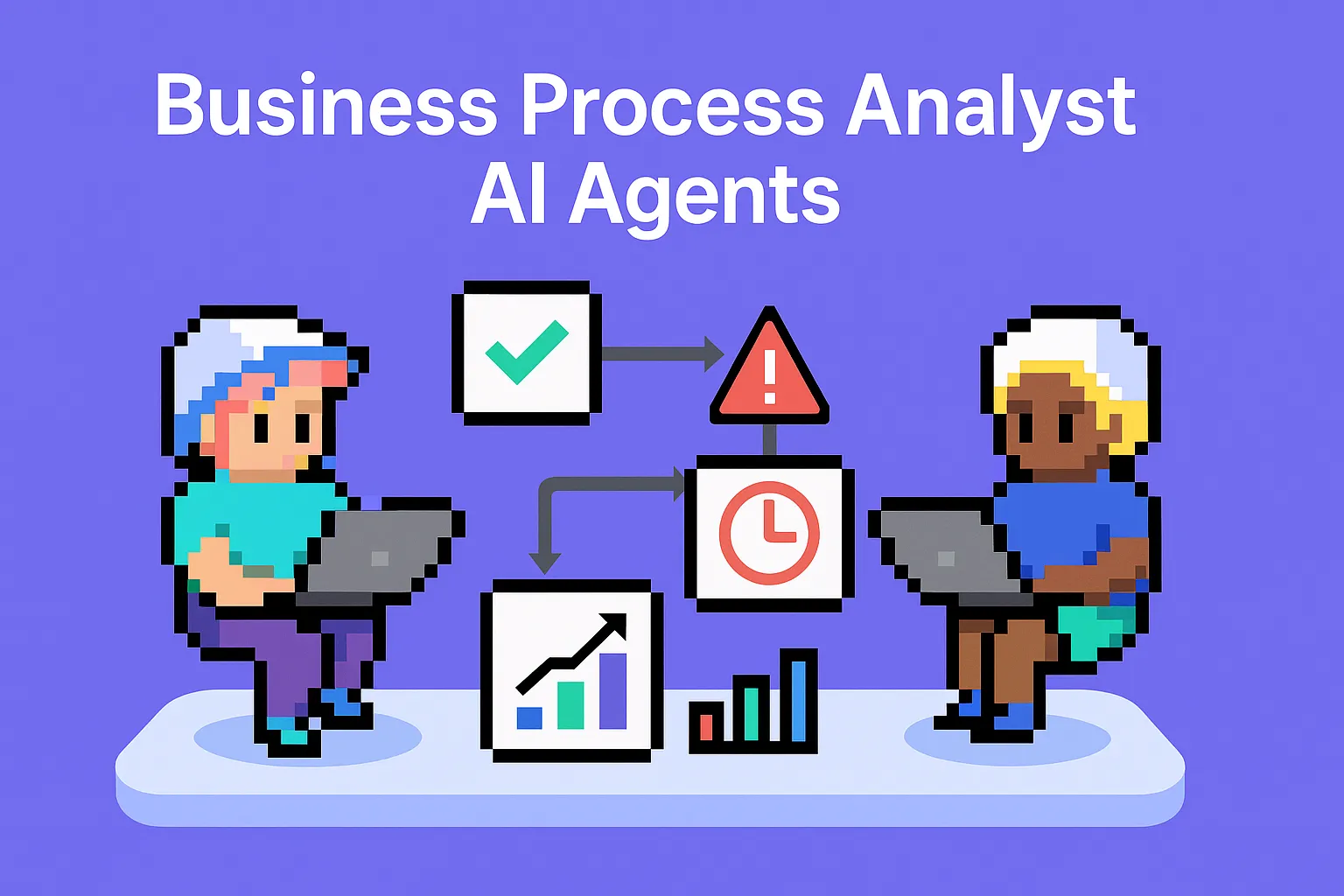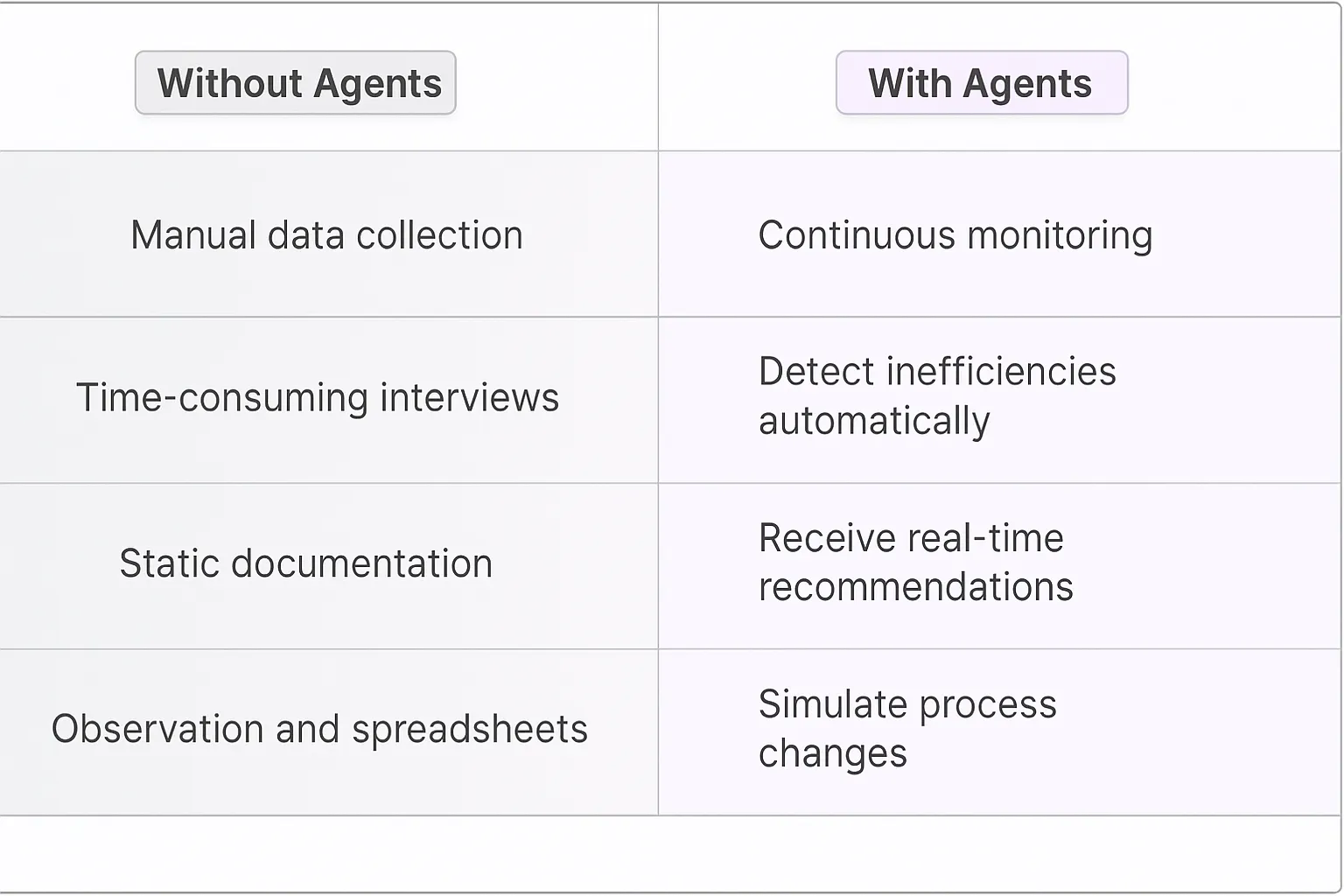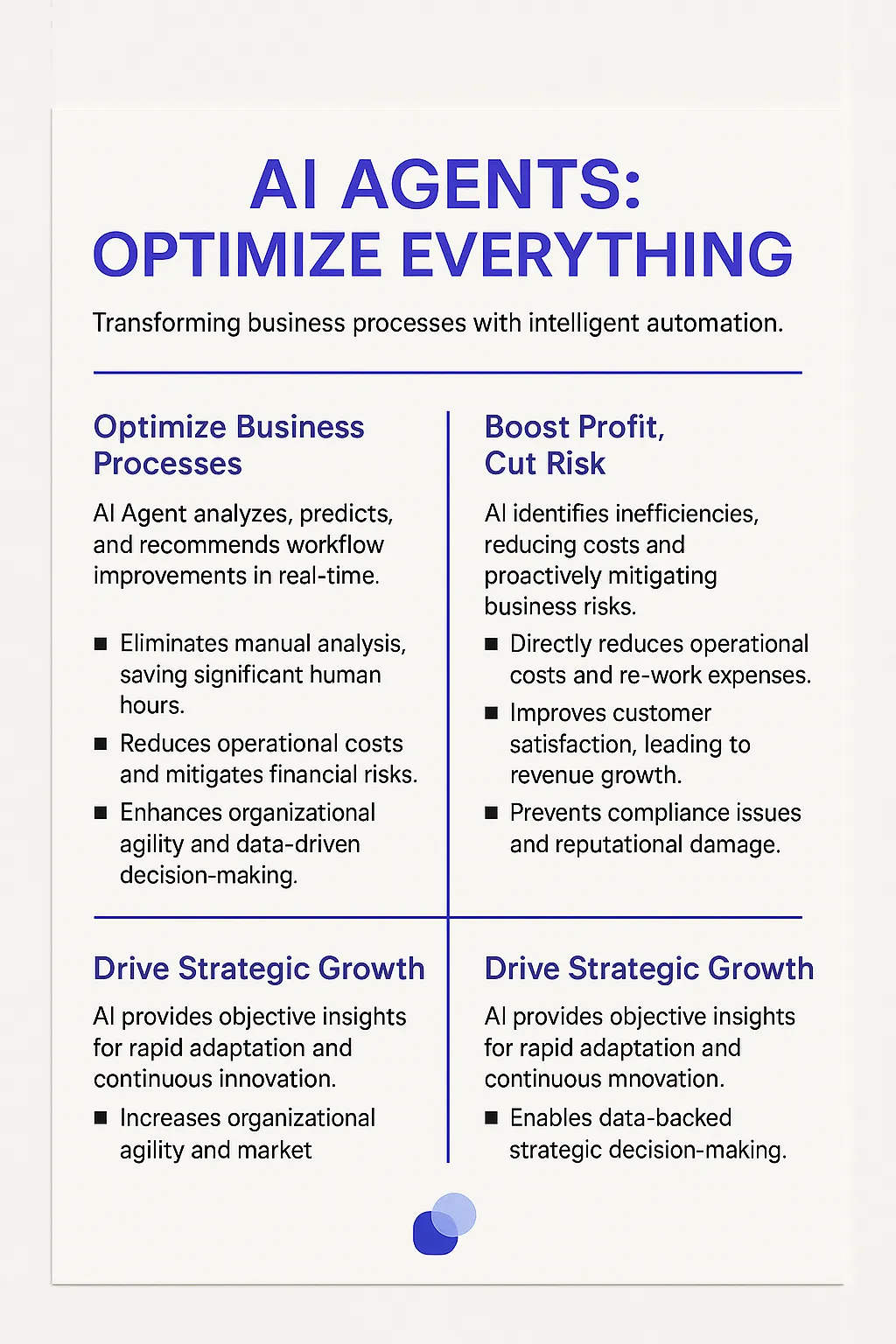Business Process Analyst is a cutting-edge software solution that combines the power of artificial intelligence with the expertise of process analysis. It's designed to dissect, understand, and optimize complex business workflows across an organization. This tool goes beyond traditional process mapping software by actively learning from data, identifying bottlenecks, and suggesting improvements in real-time.
1. Advanced Data Analytics: Utilizes machine learning algorithms to process vast amounts of operational data, uncovering hidden patterns and inefficiencies.
2. Predictive Modeling: Forecasts potential outcomes of process changes, allowing for risk-free experimentation and optimization.
3. Natural Language Processing: Interprets and generates human-readable reports, bridging the gap between technical analysis and business stakeholders.
4. Continuous Learning: Adapts and improves its analysis over time, staying up-to-date with evolving business processes and industry trends.
5. Integration Capabilities: Seamlessly connects with existing enterprise systems, providing a holistic view of organizational processes.
6. Customizable Dashboards: Offers intuitive visualizations and real-time metrics, enabling quick decision-making and performance tracking through advanced data analytics.

Before AI agents entered the scene, business process analysts were stuck in a world of manual data crunching and endless spreadsheets. They'd spend hours poring over process logs, conducting interviews, and creating flowcharts by hand. It was like trying to solve a Rubik's Cube blindfolded – possible, but painfully slow and prone to errors.
Traditional business intelligence tools and process mining software offered some relief, but they still required significant human intervention to interpret results and implement changes. Analysts were the unsung heroes, burning the midnight oil to connect dots and uncover insights that could drive process improvements.
Enter AI agents – the game-changers that are redefining how business process analysts work. These digital teammates are like having a team of genius interns who never sleep, never complain, and always deliver. Here's why they're causing such a stir:
1. Superhuman pattern recognition: AI agents can analyze vast amounts of process data in minutes, spotting trends and anomalies that would take humans weeks to uncover. They're not just fast; they're seeing the matrix of business processes in ways we never could.
2. Predictive insights: These agents don't just look at what happened; they forecast what's going to happen. They're like business fortune tellers, but with actual data to back up their predictions. This allows analysts to get ahead of problems before they even occur.
3. Continuous improvement: AI agents don't clock out at 5 PM. They're constantly learning, adapting, and refining their understanding of business processes. It's like having a process improvement engine that's always running in the background.
4. Natural language processing: Forget about translating business speak into tech jargon. These AI agents can understand and communicate in plain English (or any language, really). They're bridging the gap between IT and business stakeholders, making collaboration smoother than ever.
5. Simulation capabilities: Want to test a process change without risking real-world consequences? AI agents can run thousands of simulations, giving analysts a risk-free playground to experiment with process tweaks.
6. Automated documentation: Say goodbye to tedious report writing. AI agents can generate comprehensive process documentation on the fly, freeing up analysts to focus on strategic thinking rather than paperwork.
The bottom line? AI agents are turning business process analysts into strategic powerhouses. They're not replacing analysts; they're amplifying their capabilities, allowing them to focus on high-value tasks that truly move the needle for businesses. It's not just an upgrade; it's a whole new playing field.

Business process analysts are constantly seeking ways to optimize workflows and improve operational efficiency. AI agents can be game-changers in this field, offering capabilities that go beyond traditional analysis tools. These digital teammates can dive deep into complex data sets, identify patterns, and suggest process improvements that might escape human observation.
One key area where AI agents excel is in process mapping and documentation. They can quickly analyze existing workflows, create detailed process maps, and even suggest potential bottlenecks or inefficiencies. This allows business process analysts to focus on strategic decision-making rather than getting bogged down in the minutiae of documentation.
Another powerful application is in predictive modeling. AI agents can leverage historical data to forecast how proposed changes might impact various business processes. This predictive capability enables analysts to test different scenarios virtually before implementing changes in the real world, significantly reducing risk and improving the success rate of process improvements.
On a more granular level, AI agents can assist business process analysts with numerous day-to-day tasks. For instance, they can automate data collection and analysis, pulling information from various sources and presenting it in easily digestible formats. This not only saves time but also reduces the likelihood of human error in data handling.
AI agents can also help in conducting gap analysis. By comparing current processes against industry best practices or desired future states, these digital teammates can quickly identify areas for improvement. They can even suggest specific actions to bridge these gaps, providing analysts with actionable insights.
In the realm of compliance and risk management, AI agents can be invaluable. They can continuously monitor processes for adherence to regulatory requirements, flagging potential issues before they become problems. This proactive approach to compliance can save organizations from costly penalties and reputational damage.
Lastly, AI agents can assist in stakeholder communication. They can generate clear, concise reports on process performance, proposed changes, and expected outcomes. This helps business process analysts effectively communicate their findings and recommendations to decision-makers across the organization.
The integration of AI agents into the toolkit of business process analysts isn't just an incremental improvement - it's a fundamental shift in how we approach process optimization. These digital teammates are not replacing human analysts, but rather augmenting their capabilities, allowing them to work smarter, faster, and with greater impact. As organizations continue to grapple with increasing complexity and data volumes, the partnership between human analysts and AI agents will become increasingly crucial for maintaining competitive edge and driving operational excellence.

The impact of AI agents on business process analysis is profound and far-reaching. These digital teammates are reshaping how companies approach workflow optimization, decision-making, and operational efficiency. Let's dive into some concrete examples of how different industries are leveraging these AI-powered tools to gain a competitive edge and drive innovation.
From finance to healthcare, manufacturing to retail, AI agents are proving their worth by tackling complex analytical tasks, uncovering hidden insights, and proposing data-driven solutions. They're not just crunching numbers; they're becoming integral partners in strategic planning and process improvement initiatives.
What's particularly exciting is how these AI agents are adapting to industry-specific challenges. They're learning the nuances of each sector, from regulatory compliance in banking to supply chain intricacies in logistics. This specialization allows them to offer tailored recommendations that truly move the needle for businesses.
In the following examples, we'll explore how AI agents are transforming business process analysis across various industries, showcasing their ability to enhance productivity, reduce costs, and drive innovation in ways that were previously unimaginable.
Let's talk about how Business Process Analyst AI Agents are turning the retail industry on its head. These digital teammates are like having a team of genius inventory managers working 24/7, but without the need for coffee breaks or vacation time.
Picture a massive retail chain with thousands of stores across the country. Traditionally, inventory management has been a nightmare of spreadsheets, guesswork, and human error. Enter the Business Process Analyst AI Agent.
This AI doesn't just crunch numbers; it's constantly learning from real-time data. It analyzes purchasing patterns, seasonal trends, local events, and even weather forecasts to predict demand with uncanny accuracy. The result? Stores stock exactly what they need, when they need it.
But here's where it gets really interesting. These AI agents don't just optimize existing processes - they reinvent them. They might suggest counterintuitive strategies like deliberately understocking certain items to create scarcity and drive demand. Or they could recommend dynamic pricing strategies that change in real-time based on factors like time of day, local events, or even social media sentiment.
The impact is profound. Retailers using these AI agents are seeing inventory costs plummet while sales soar. They're reducing waste, improving customer satisfaction, and gaining a competitive edge that's hard to match.
This isn't just automation; it's augmentation on a whole new level. These AI agents are becoming indispensable partners, offering insights and strategies that even the most experienced human analysts might miss. They're not replacing humans; they're empowering them to make better decisions faster.
As these AI agents continue to learn and evolve, we're likely to see even more innovative approaches to retail operations. The possibilities are mind-boggling. Who knows? The next retail revolution might just be dreamed up by an AI.
The manufacturing sector is undergoing a seismic shift, and Business Process Analyst AI Agents are at the epicenter. These digital teammates are transforming production lines with a level of precision and adaptability that would make even the most seasoned factory manager's head spin.
Take a high-tech electronics manufacturer churning out millions of smartphones annually. Traditionally, optimizing production has been a complex dance of supply chains, machine maintenance, and workforce management. Now, AI agents are orchestrating this dance with unprecedented grace.
These AI agents don't just monitor production metrics; they're constantly running simulations and what-if scenarios. They're analyzing everything from raw material prices to geopolitical events that could impact supply chains. But here's the kicker - they're doing it in real-time, adjusting production schedules on the fly.
One of the most fascinating aspects is how these AI agents are tackling the age-old challenge of machine downtime. They're not just predicting when a machine might fail; they're suggesting optimal maintenance schedules that balance the cost of downtime against the cost of maintenance. It's like having a crystal ball that also does cost-benefit analysis.
But it gets even more interesting. These AI agents are starting to make decisions that seem counterintuitive at first glance. For instance, they might recommend temporarily slowing down production to implement a new process that will boost efficiency in the long run. It's the kind of strategic thinking that usually requires years of human experience.
The impact on the bottom line is staggering. Manufacturers using these AI agents are seeing dramatic increases in output quality while simultaneously reducing waste and energy consumption. They're able to pivot production faster in response to market demands, giving them a huge competitive advantage.
This isn't just about making existing processes more efficient. These AI agents are fundamentally changing how we think about manufacturing. They're enabling a level of flexibility and responsiveness that was previously unimaginable in large-scale production environments.
As these AI agents continue to learn and evolve, we're likely to see even more radical innovations in manufacturing. The factory of the future might look more like a living organism, constantly adapting and evolving, than a static production line. And at the heart of it all will be these incredibly sophisticated AI agents, silently orchestrating a manufacturing revolution.
Implementing a Business Process Analyst AI Agent isn't a walk in the park. It's more like trying to teach a robot to dance salsa while juggling flaming torches. The first hurdle? Data integration. Your AI needs to slurp up data from a smorgasbord of sources - ERPs, CRMs, legacy systems, and that dusty Excel sheet Bob from accounting swears by. It's a data buffet, and your AI needs to digest it all without getting indigestion.
Then there's the machine learning model itself. Training it is like raising a particularly stubborn teenager. It needs to understand the nuances of your business processes, recognize patterns, and make recommendations that don't make your CFO spill their coffee. And let's not forget about scalability. As your business grows, your AI needs to keep up. It's like expecting your childhood treehouse to accommodate a Fortune 500 company.
On the operational front, you're essentially introducing a new team member that never sleeps, never takes vacations, and has an uncanny ability to point out inefficiencies. Sounds great, right? Well, not everyone will be thrilled. Some employees might view the AI as the office snitch, always watching, always reporting. It's crucial to frame the AI as a helpful digital teammate rather than Big Brother's all-seeing eye.
Change management is another beast altogether. Implementing a Business Process Analyst AI Agent is like trying to change the tires on a moving car. You need to keep the business running while simultaneously overhauling how things are done. It requires a delicate balance of persistence and patience, much like trying to herd cats... while the cats are on roller skates.
Lastly, there's the challenge of continuous improvement. Your AI isn't a set-it-and-forget-it solution. It needs constant fine-tuning, regular updates, and occasional reality checks. It's like having a gym membership - the real work starts after you sign up. You need a dedicated team to monitor the AI's performance, validate its recommendations, and ensure it's not going rogue and suggesting you replace all your employees with an army of robots.
Business Process Analyst AI Agents are not just another tech fad - they're the vanguard of a new era in operational excellence. These digital teammates are redefining how organizations approach process optimization, decision-making, and strategic planning. By automating routine tasks, uncovering hidden insights, and providing predictive analytics, they're freeing up human analysts to focus on high-value, creative problem-solving.
The impact of these AI agents extends far beyond mere efficiency gains. They're enabling businesses to adapt more quickly to market changes, innovate at a faster pace, and make data-driven decisions with unprecedented accuracy. As these tools continue to evolve, we can expect to see even more transformative applications across industries.
However, it's crucial to remember that AI agents are not a silver bullet. Their successful implementation requires careful planning, ongoing management, and a willingness to embrace change. Organizations that can effectively integrate these digital teammates into their workflows, while addressing the associated technical and operational challenges, will be well-positioned to thrive in an increasingly competitive and data-driven business landscape.
The future of business process analysis is here, and it's powered by AI. Those who embrace this technology now will be the ones setting the pace in their industries tomorrow. The question isn't whether to adopt these tools, but how quickly and effectively you can integrate them into your organization's DNA.